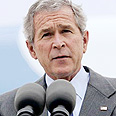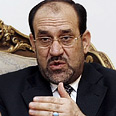
Bush won't let Iran, Syria have the last word
Photo: AP

Iraqi PM al-Maliki
Photo: Reuters
WASHINGTON - US President George W. Bush is expected to visit Jordan next Wednesday and Thursday to attend a forum of moderate Arab nations and, while there, to meet with Iraqi Prime Minister Nouri al-Maliki.
Wednesday night, concurrent statements were released from Baghdad and Air Force One, regarding the importance of the meeting, meant to address the difficult security situation in Iraq.
In additional to internal American pressure on Bush, and the expected submission of the Baker-Hamilton Committee report (regarding recommendations for American policy in Iraq), Iran and Syria have recently begun exerting pressure in the region that demands a presidential response.
Syrian Foreign Minister Walid Moallem paid a landmark visit to Baghdad this week, signing an agreement to restore foreign relations between his country and Iraq that had been severed for nearly 25 years.
Pursuant to the visit, Iranian President Mahmoud Ahmadinejad invited Iraq's Kurdish and pro-American president Jalal Talabani, along with Syrian President Bashar Assad, to attend a summit in Tehran.
The summit's objective: To create joint pressure for a date to be set for the pullout of US troops from Iraq.
The American government was forced to respond. Although Secretary of State Condoleezza Rice was originally supposed to be the US representative at the forum in Amman, it was decided to send the president instead, thus giving the US the last word after the Tehran summit.
Washington didn't want to create the impression that Iran is calling the rules of the game in the Middle East in general, and in Iraq in particular.
Important for ME nations to promote stability
National Security Advisor Stephen Hadley told journalists on Air Force One that the president has no objection to improved relations between Iraq, Syria and Iran.It's important for Iran to be able to speak to these countries directly, in order to stress to them their responsibility for playing a positive role towards security, stability and democracy in Iraq, Hadley emphasized.
In addition to meeting with the Iraqi prime minister during the forum, Bush may also meet with leaders of moderate Arab nations to discuss the Iraqi – and possibly also the Palestinian – situation. No formal declaration has been made one way or another.
Sources in Jerusalem have been keeping watch for a possible meeting of the Quartet with moderate Arab nations in Amman in order to advance the Israeli-Palestinian situation, in the event of the formation of a Palestinian unity government that complies with the Quartet's preconditions.
However, White House Spokesman Tony Snow's statement on Air Force One addressed only the Bush-al-Maliki meeting. The meeting will focus on increasing security and stability in Iraq, Snow said.
Snow stated that talks would focus on recent events in Iraq, the possibility of Iraq taking more responsibility for its own security, and, last but not least, the responsibility of nations in the region to support Iraq.
Such a focus is an implicit American demand for Syria and Iran to cease assisting and encouraging the riots in Iraq.















